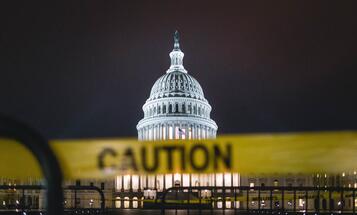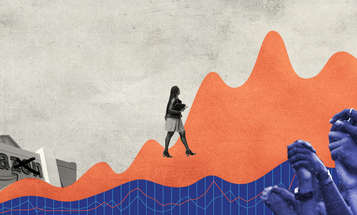
How a Lack of Democracy Worsened the Texas Storm Disaster
The winter storm disaster in Texas was a crisis fueled by a failure to address climate change and the influence of oil and gas companies on state and local politics.

When brutal winter storms hit Texas in mid-February, tens of millions of residents lost power and heat and more than half of the state’s households were informed that the water coming out of their tap was unsafe to drink. Many had no water at all. A legacy of underinvestment in the state’s Black and Latino communities—already reeling from the mismanaged pandemic and economic collapse—has further exacerbated the impact of the storms on these communities. The complete death toll from the calamity is still unknown.
[S]tate and local political decisions also worsened the crisis immeasurably.
The storms were more than a natural disaster: Not only do scientists find evidence that our global failure to address climate change is contributing to the severity of winter storms, but state and local political decisions also worsened the crisis immeasurably. In critical ways, the storms’ catastrophic impact can be traced back to a shortfall of democracy in both Texas’ political system and its economy.
Oil and gas companies have long dominated Texas state politics and continue to be the biggest source of campaign funding, with especially lavish backing for Texas Governor Greg Abbott. The industry’s pervasive influence over state policymakers and key regulators like the public utility commission and the Energy Reliability Council of Texas helps explain why the state’s electric grid has remained isolated from the rest of the country, evaded regulations that could have protected consumers, and failed to invest in weatherizing its basic infrastructure despite years of repeated recommendations and warnings about its vulnerability. Political decisions to privatize and maintain a deregulated system prioritized the interests of corporate shareholders and left fundamental public infrastructure in poor condition. In fact, many of Texas’ deregulated power companies will reap windfall profits from the devastating storms since they are allowed to charge exorbitant rates during the energy shortage—saddling any consumers who did not completely lose power with massive bills.
“For decades in Texas, a handful of corporations and politicians like Gov. Abbott have profited by privatizing our utilities and leaving the infrastructure millions of us rely on in a state of disrepair[.]" - Michelle Tremillo, Texas Organizing Project
Michelle Tremillo, executive director of the Texas Organizing Project, which organizes Black and Latino communities, pulls no punches in assigning responsibility: “For decades in Texas, a handful of corporations and politicians like Gov. Abbott have profited by privatizing our utilities and leaving the infrastructure millions of us rely on in a state of disrepair…This colossal crisis was avoidable, but Gov. Abbott, our Republican senators, and our Republican-controlled legislature lack any accountability to the people they serve.”
The Texas Organizing Project, a partner in Demos’ Inclusive Democracy Project, is working to advance accountability both at the ballot box and by pushing for more influence by directly affected consumers on the boards of public utilities. On a local level, the Texas Organizing Project is demanding greater public oversight of the city of San Antonio’s water utility. Statewide, the group is organizing public testimony about the impact of the electric grid failure. According to the Texas Tribune, the state’s electrical grid operator reserves 8 seats for “representatives of energy retailers, power generators and investor-owned utility companies” and only a single seat for a representative of the tens of millions of residential power consumers. Just as voting rights are critical for a flourishing political democracy, demanding a greater voice for Black and brown communities in controlling how public services are managed is a core element of economic democracy.
Texas is the biggest and most recent example of the impact that democratic shortfalls have on people’s daily lives. Yet from Michigan to Massachusetts, struggles for community control over public utilities and infrastructure are playing out around the country. They can mean the difference between meeting community needs for cleaner, more reliable and affordable power systems and shivering in the dark.




